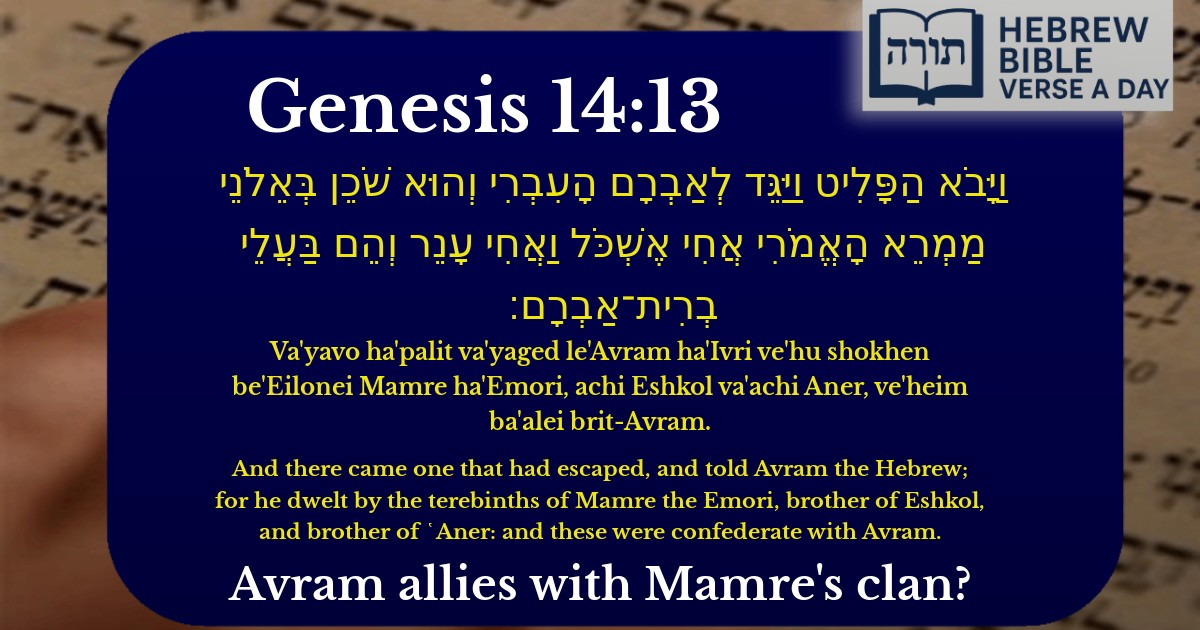Join Our Newsletter To Be Informed When New Videos Are Posted
Join the thousands of fellow Studends who rely on our videos to learn how to read the bible in Hebrew for free!
Hebrew Text
וַיָּבֹא הַפָּלִיט וַיַּגֵּד לְאַבְרָם הָעִבְרִי וְהוּא שֹׁכֵן בְּאֵלֹנֵי מַמְרֵא הָאֱמֹרִי אֲחִי אֶשְׁכֹּל וַאֲחִי עָנֵר וְהֵם בַּעֲלֵי בְרִית־אַבְרָם׃
English Translation
And there came one that had escaped, and told Avram the Hebrew; for he dwelt by the terebinths of Mamre the Emori, brother of Eshkol, and brother of ῾Aner: and these were confederate with Avram.
Transliteration
Va'yavo ha'palit va'yaged le'Avram ha'Ivri ve'hu shokhen be'Eilonei Mamre ha'Emori, achi Eshkol va'achi Aner, ve'heim ba'alei brit-Avram.
Hebrew Leining Text
וַיָּבֹא֙ הַפָּלִ֔יט וַיַּגֵּ֖ד לְאַבְרָ֣ם הָעִבְרִ֑י וְהוּא֩ שֹׁכֵ֨ן בְּאֵֽלֹנֵ֜י מַמְרֵ֣א הָאֱמֹרִ֗י אֲחִ֤י אֶשְׁכֹּל֙ וַאֲחִ֣י עָנֵ֔ר וְהֵ֖ם בַּעֲלֵ֥י בְרִית־אַבְרָֽם׃
וַיָּבֹא֙ הַפָּלִ֔יט וַיַּגֵּ֖ד לְאַבְרָ֣ם הָעִבְרִ֑י וְהוּא֩ שֹׁכֵ֨ן בְּאֵֽלֹנֵ֜י מַמְרֵ֣א הָאֱמֹרִ֗י אֲחִ֤י אֶשְׁכֹּל֙ וַאֲחִ֣י עָנֵ֔ר וְהֵ֖ם בַּעֲלֵ֥י בְרִית־אַבְרָֽם׃
🎵 Listen to leining
Parasha Commentary
📚 Talmud Citations
This verse is not quoted in the Talmud.


Context of the Verse
The verse (Bereshit 14:13) describes an event following the war of the four kings against the five kings, where Lot, Avram's nephew, was taken captive. A survivor of the battle comes to inform Avram, who is referred to here as "הָעִבְרִי" (the Hebrew). This is the first time Avram is called "the Hebrew" in the Torah, marking his distinct identity.
Avram as "הָעִבְרִי" (the Hebrew)
Rashi explains that Avram is called "הָעִבְרִי" because he descended from עֵבֶר (Eber), a descendant of Shem. Alternatively, the Midrash (Bereshit Rabbah 42:8) offers that the term signifies Avram's alignment with the "other side" (עֵבֶר) of the world, as he stood apart from the idolatrous beliefs of his contemporaries. Ramban adds that this title emphasizes Avram's unique role as a monotheist in a polytheistic world.
Avram's Dwelling Place: "אֵלֹנֵי מַמְרֵא" (the Terebinths of Mamre)
Avram resided near the terebinths of Mamre, an Emorite. The Talmud (Sotah 10a) notes that Mamre was the one who advised Avram to perform the mitzvah of circumcision (Bereshit 17:23-27). This location is significant because it reflects Avram's diplomatic relationships with local leaders while maintaining his spiritual integrity.
The Confederates: Eshkol, Aner, and Mamre
The verse mentions that Eshkol and Aner were brothers of Mamre and "בַּעֲלֵי בְרִית־אַבְרָם" (allies of Avram). Rashi explains that they had entered into a treaty with Avram for mutual defense. The Radak elaborates that this alliance was based on shared interests but did not compromise Avram's religious principles. The Midrash (Bereshit Rabbah 42:13) suggests that these alliances were part of Hashem's plan to ensure Avram's safety and influence in the land.
The Role of the "פָּלִיט" (the Escapee)
The escapee who brings news of Lot's capture plays a crucial role in prompting Avram's rescue mission. The Malbim explains that this was divinely orchestrated to demonstrate Avram's righteousness and his commitment to family. The Netziv adds that the escapee's report tested Avram's willingness to act with courage and chessed (kindness) despite personal risk.